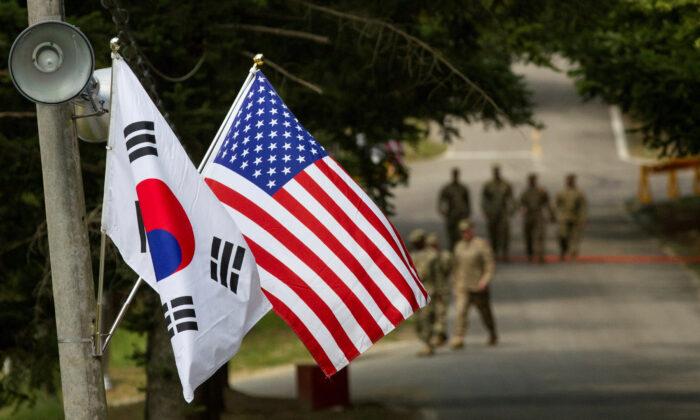The countries agreed to cooperate on increasing resiliency in “supply chains, including in priority sectors such as semiconductors, eco-friendly EV batteries, strategic and critical materials, and pharmaceuticals,” according to the joint statement.
Biden and Moon agreed to strengthen their partnership on critical and emerging technologies and on “careful screening of foreign investments and cooperation on export controls” of those technologies.
Semiconductor Supremacy
The White House convened a virtual summit last month with 19 multinational enterprises to address the global semiconductor chip shortage. Biden stressed during the videoconference the necessity of investing in the semiconductor industry and the expansion of U.S.-centric supply chains.Prior to the summit, some experts had predicted the issue of supply chains in four core areas, including semiconductors, would be the focus of the summit.
Cho Dong-geun, an honorary professor of Economics at Myongji University, South Korea, told The Epoch Times that the United States is the tech-powerhouse of semiconductors, but heavily relies on foreign manufacturers for production.
In February, the Semiconductor Industry Association had sent a letter to Biden, urging him to provide “substantial funding for incentives for semiconductor manufacturing” as part of his economic recovery and infrastructure plans, as the U.S. share of semiconductor manufacturing has dropped from 37 percent in 1990 to 12 percent this year.
The shortage of semiconductors has forced U.S. auto manufacturers to cut production. The U.S. is thus working on technology alliances to ease the demand for chips. South Korea, the world’s leading vendor in semiconductor memory, and Taiwan, the world’s top foundry supplier, have become two major semiconductor production bases.
US Moves to Block Chinese Semiconductor Dominance
While the United States ramps up its domestic semiconductor production, it also working to block China from usurping semiconductor hegemony. Cho believes that the Sino-U.S. battle for semiconductor hegemony is a “foreseeable war” that is inevitable.He said, “The idea of Thucydides’s Trap warns that when a rising power threatens an established power, the two nations are set on a collision course toward war.”
“As the Chinese regime realizes its so-called Chinese Dream by promoting its communist ideology and ’socialism with Chinese characteristics’ worldwide, it runs counter to American values, setting off the alarm. War is inevitable and looming on the horizon.”
According to Cho, in the semiconductor sector, the CCP’s Achilles heel is its lack of research and development capacity and ability to innovate.
“Basically, the success of semiconductor research and development cannot be achieved overnight,” Cho added. “The U.S. semiconductor industry has gradually evolved and developed to this point while the CCP has only recently started. The strong technological strength of the U.S. apparently dwarfs that of the CCP, and the development of cutting-edge technologies takes time.”
‘US for Security, China for Economy’?
Cho believed that if South Korea cannot partake in the U.S.-led semiconductor supply network, its semiconductor industry will be adversely affected amid the Sino-U.S. tech war. Moreover, Biden signed an executive order to review U.S. supply chains in February for four core products—semiconductor chips, batteries for electric vehicles, rare earth minerals, and pharmaceuticals—the results of which will come out in June.“Speaking of semiconductor supply chain and semiconductor value chain, from an economic perspective, it is in South Korea’s best interests to join the alliance,“ Cho said. ”If it decouples from the alliance, Taiwan Semiconductor Manufacturing Company (TSMC) will take business away and South Korea will not have a piece of the action. On the contrary, if TSMC, Intel, and Samsung form a coalition, like fighter jets in action, South Korea will benefit from it.”
“The argument for security alliance with the U.S. and economic dependence on China is ridiculous,” he said. “Which socialist authoritarian state thrives? With freedom, the economy will grow, the culture will prosper, the nation will get stronger, and the political system will get healthier. Therefore, the system will only develop when people get to exercise their liberty. Is it not the nation with a healthy political system now dominating the global economy and politics?”


Friends Read Free